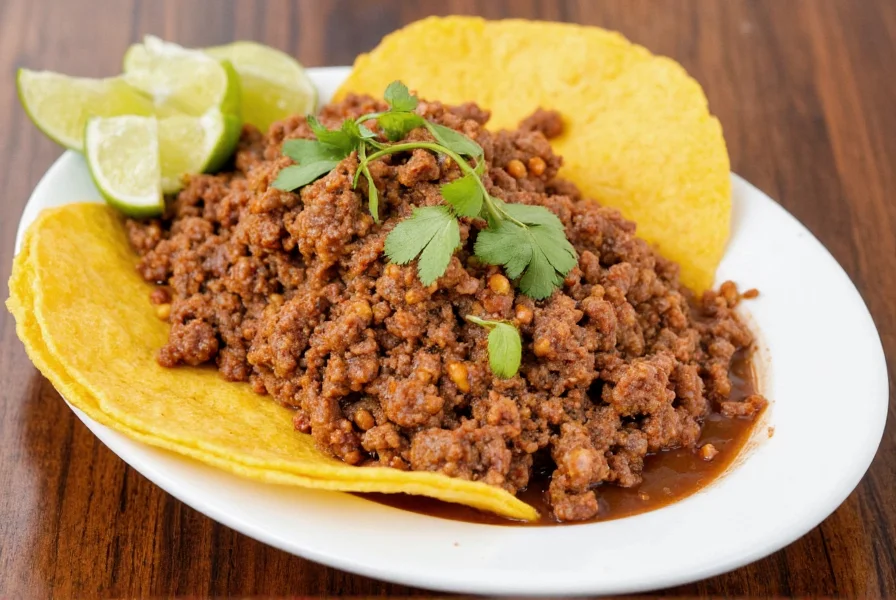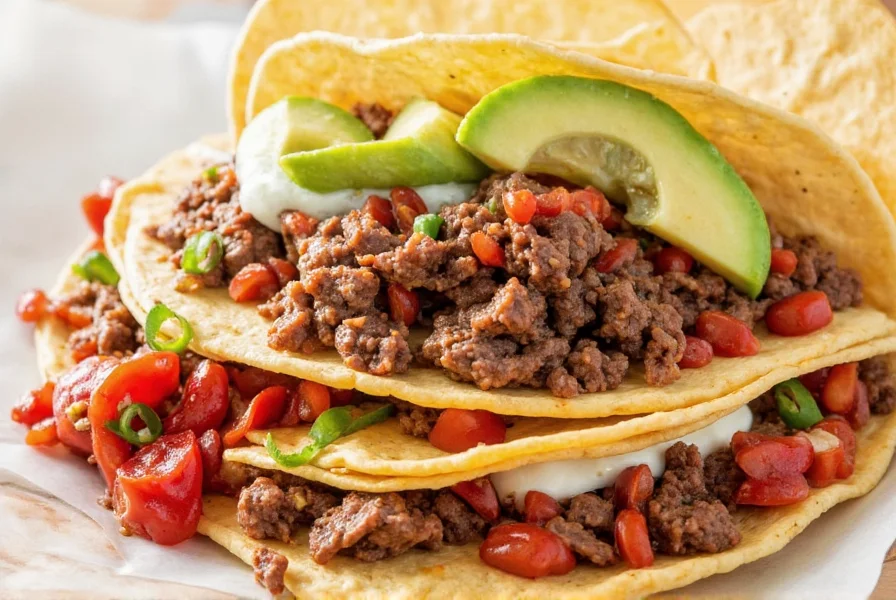Seasoned beef is the foundation of authentic, flavorful tacos. Whether you're preparing a quick weeknight dinner or hosting a festive gathering, the right spice blend transforms simple ground beef into a culinary masterpiece. This guide covers everything from essential spices to professional techniques for perfect taco beef every time.
Why Seasoned Beef?
Seasoned ground beef has become a taco staple for good reason. It's not just about adding flavor—it's about creating a balanced, complex taste profile that elevates the entire dish. Plain browned beef lacks depth, while properly seasoned beef delivers warmth, spice, and that signature Mexican-inspired kick we crave.
Seasoned beef serves as the perfect canvas for bold spices, making it versatile enough for soft tortillas, crunchy shells, lettuce wraps, or even taco bowls. The right seasoning blend can make the difference between an ordinary meal and an unforgettable experience.
The Spice Basics: What Makes It Tasty
Understanding foundational spices is key to mastering taco beef. Here are the essential ingredients that create the iconic taco flavor:
- Cumin – Earthy and warm, the backbone of most taco seasonings.
- Chili Powder – Adds mild heat and vibrant color (distinct from chili flakes).
- Paprika – Brings sweetness and smokiness depending on the type used.
- Garlic Powder & Onion Powder – Essential for savory depth and aroma.
- Oregano – Adds herbal brightness and complexity.
- Salt & Pepper – Crucial for balancing and enhancing all other flavors.

The Art of Balance
Perfect taco seasoning isn't about throwing in as many spices as possible—it's about harmony. Too much cumin can overpower other flavors, while too little chili powder might leave your beef tasting bland. Think of it like mixing paint colors: the goal is to create a balanced, complementary blend that enhances the meat without overwhelming it.
Top 5 Seasoning Blends for Taco Beef
While homemade seasoning gives you full control, store-bought blends offer convenience and consistency. Here's a comparison of five top-rated options for different needs:
| Brand | Key Ingredients | Flavor Profile | Heat Level | Best For | Price Range |
|---|---|---|---|---|---|
| Taco Bell | Chili, garlic, oregano, paprika | Classic, bold | Mild | Families and casual taco nights | $ |
| Old El Paso | Chili, salt, cumin, onion | Traditional Tex-Mex | Moderate | Soft tacos, burritos, nachos | $ |
| McCormick | Cumin, paprika, garlic, oregano | Balanced and aromatic | Mild | Chef-driven recipes and foodies | $$ |
| Goya Sazón | Annatto, coriander, garlic | Earthy, vibrant | Mild | Those looking for Puerto Rican influence | $$ |
| Trader Joe's | Chili, smoked paprika, garlic | Smoky and rich | Moderate | Weekend cooking and gourmet tacos | $$ |
How to Season Ground Beef Like a Pro
Knowing the right spices is only half the battle—proper technique makes all the difference. Follow these steps for restaurant-quality taco beef:
- Brown the beef first: Cook ground beef in a skillet over medium-high heat until browned and crumbly. Drain excess fat if needed.
- Add aromatics: Sauté onions and garlic before adding the beef for extra depth and aroma.
- Introduce liquid: A splash of water, broth, or tomato sauce helps dissolve the spices and coat the meat evenly.
- Season after browning: Add your seasoning mix once the beef is mostly cooked to prevent burning and ensure even distribution.
- Simmer for richness: Let the mixture simmer for 5–10 minutes so the flavors meld together completely.

Pro Tip:
Don't skip the simmer! This is where the magic happens. Simmering allows the spices to fully penetrate the beef, creating that "restaurant-quality" flavor profile that elevates your tacos.
Buying Guide: Choosing the Right Seasoning
If you prefer store-bought blends, here's what to look for when shopping:
- Natural Ingredients: Avoid artificial preservatives or fillers like maltodextrin. Look for short ingredient lists with recognizable spices.
- Heat Level: Choose based on your family's preference—mild, medium, or hot—there's no one-size-fits-all.
- Authenticity: Check whether the blend reflects regional styles (e.g., Tex-Mex vs. Oaxacan) for authentic flavor.
- Versatility: Some blends can double as seasoning for rice, beans, or roasted veggies, making them more valuable.
Best Picks by Use Case
- Best for Families: Old El Paso — familiar, kid-friendly flavor profile.
- Best for Gourmets: McCormick Gourmet Blend — complex layers and refined taste.
- Best for Bold Flavors: Trader Joe's Smoked Taco Seasoning — deep, smoky notes perfect for adventurous eaters.
- Best for Health-Conscious Eaters: Simply Organic Taco Seasoning — organic and low-sodium options available.
- Best Budget Buy: Store brands like Kroger or Walmart's Great Value — affordable yet flavorful.
Bonus Taco Tips and Assembly Tricks
Great seasoned beef deserves equally great toppings and presentation. Here are pro tips to make your tacos stand out:
- Use Warm Tortillas: Cold tortillas = sad tacos. Warm them in a dry skillet or microwave with a damp paper towel.
- Add Freshness: Cilantro, lime wedges, diced onions, and avocado bring brightness to every bite.
- Play With Texture: Try pickled jalapeños, shredded cabbage, or crispy tortilla strips for added crunch.
- Don't Overload: It's tempting to pile on everything, but moderation keeps your taco from falling apart mid-bite.
- Dress Up Your Plate: Serve with Mexican rice, refried beans, and a dollop of guacamole or salsa for a complete meal.
Frequently Asked Questions
How much taco seasoning should I use per pound of ground beef?
For best results, use 2-3 tablespoons of taco seasoning per pound of cooked ground beef. If using a pre-made mix, follow the package instructions as some blends are more concentrated than others. When making your own seasoning, start with 2 tablespoons and adjust to taste after simmering.
Can I use lean ground beef for tacos or does it need to be higher fat?
You can use lean ground beef (90% lean or higher), but traditional taco beef often uses 80-85% lean beef for better flavor and moisture. If using lean beef, consider adding a small amount of olive oil when cooking or incorporating a tablespoon of tomato paste to maintain moisture. The fat helps carry the flavors of the spices throughout the meat.
What's the difference between taco seasoning and fajita seasoning?
Taco seasoning typically contains more cumin and chili powder for that classic taco flavor, while fajita seasoning emphasizes bell peppers and onions with more paprika and less cumin. Taco seasoning is designed to be mixed directly with ground beef, whereas fajita seasoning is usually used with sliced meats and vegetables that are cooked together. The heat level in taco seasoning is often higher than in fajita seasoning.
How can I make my seasoned beef less salty?
If your seasoned beef turns out too salty, try these solutions: 1) Add an acid like lime juice to balance the saltiness, 2) Mix in unsalted cooked beans or additional cooked ground beef, 3) Add a small amount of sugar or honey to counteract the salt, or 4) Simmer with extra water or unsalted broth to dilute the salt content. For future batches, reduce the amount of seasoning or choose low-sodium options.
Can I make taco seasoning without chili powder?
Yes, you can make taco seasoning without chili powder by substituting with a combination of paprika, cumin, and a pinch of cayenne pepper for heat. For each tablespoon of chili powder needed, use 2 teaspoons paprika, 1 teaspoon cumin, and 1/8 teaspoon cayenne. You can also add a small amount of tomato paste when cooking the beef to compensate for the depth that chili powder would normally provide.
How long does seasoned beef keep in the refrigerator?
Properly stored in an airtight container, seasoned beef will keep in the refrigerator for 3-4 days. For longer storage, freeze the beef in portion-sized containers for up to 3 months. When reheating, add a splash of water or broth to restore moisture, as the spices can continue to absorb liquid while stored. Always reheat to an internal temperature of 165°F (74°C) for food safety.
Conclusion
Whether you're a seasoned cook or just starting your spice journey, mastering seasoned beef for tacos opens the door to endless culinary possibilities. From classic Tex-Mex to modern fusion creations, the right spice blend makes all the difference.
So next time you reach for that package of ground beef, don't settle for boring. Grab your favorite taco seasoning, fire up the pan, and turn dinner into a fiesta. ¡Buen provecho!










 浙公网安备
33010002000092号
浙公网安备
33010002000092号 浙B2-20120091-4
浙B2-20120091-4